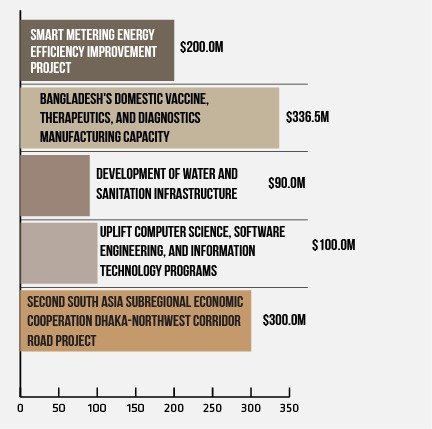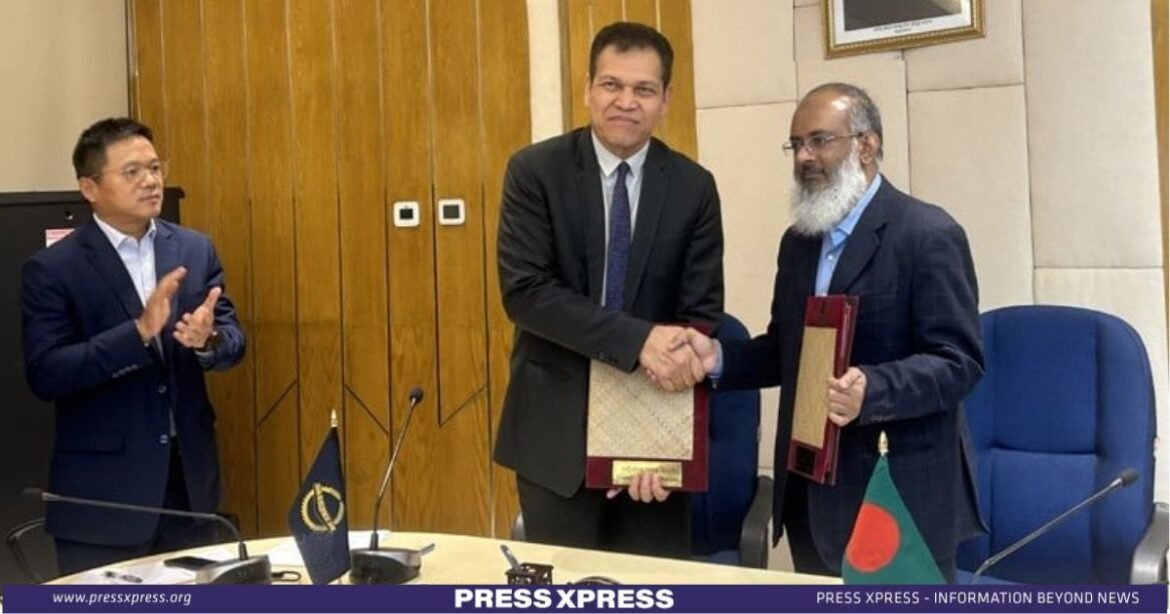Key Highlights:
- Projects expected to reduce 400,000 tons of CO2 emissions
- Installing 650,000 smart prepaid gas meters in South Dhaka and Narayanganj
- Ensuring a continuous supply of drinking water, promote sanitation, and manage solid water
In a significant move to ensure sustainable development, Bangladesh has successfully secured $1.026 billion in financing from the Asian Development Bank (ADB) to bolster projects spanning energy, health, sanitation, technology, and connectivity sectors.
You Can Also Read: ADB Forecasts Promising FY2024 Outlook for Bangladesh
The agreements, signed on November 28 by Md Shahriar Kader Siddiky, secretary to the Economic Relations Division (ERD), and Edimon Ginting, ADB country director for Bangladesh, mark a pivotal moment in the nation’s pursuit of comprehensive development.
Promoting Energy Efficiency
The ADB will contribute $200 million to propel Bangladesh towards energy efficiency through the Smart Metering Energy Efficiency Improvement Project. This initiative addresses critical challenges in Bangladesh’s energy sector, characterized by a heavy reliance on natural gas and significant losses within the gas distribution network due to outdated infrastructure and inefficient consumption patterns among unmetered residential customers.
The project’s primary focus is on reducing losses by installing 650,000 smart prepaid gas meters (SPGMs) for residential customers, particularly in South Dhaka and Narayanganj. This measure aligns with Bangladesh’s climate mitigation goals outlined in its nationally determined contributions under the Paris Agreement, with an anticipated annual reduction of approximately 400,000 tons of carbon dioxide emissions.
According to ADB Senior Energy Specialist Atsumasa Sakai, “Smart meters play a crucial role in influencing consumers’ behavior and reducing energy losses. Bangladesh’s economy faces increasing vulnerability due to the rising costs of imported energy, impacting both energy security and industrial production. Mitigating wastage and enhancing the efficiency of domestic gas use is a governmental priority to address economic growth concerns and climate change impacts.”
Beyond environmental benefits, the project incorporates a comprehensive safety awareness program among customers and promotes safety standards for gas cooking appliances. This dual approach aims to minimize gas-related accidents and ensure safe energy access, particularly for socially disadvantaged groups such as women and residents from lower-income communities.
Implementation of the project involves the adoption of advanced digital technologies, including smart meters integrated with a unified metering data management system and an automated web-based grievance management system. This transformative approach aligns with modernized strategies, ensuring a sustainable and efficient gas distribution system for the benefit of all stakeholders.
Developing Vaccine Production
A substantial investment of $336.5 million will fortify Bangladesh’s domestic vaccine, therapeutics, and diagnostics manufacturing capacity. The Vaccines, Therapeutics, and Diagnostics Manufacturing and Regulatory Strengthening Project will establish a state-of-the-art facility in Gopalganj, capable of producing 58 million vials of vaccines annually.
Dinesh Arora, ADB Principal Health Specialist, emphasized the project’s importance in addressing challenges revealed by the Covid-19 pandemic, stating, “Our experience with the pandemic exposed challenges in accessing diagnostic testing kits, availability of vaccines, and pandemic preparedness. It highlighted the need to improve self-sufficiency and establish capacity to manufacture vaccines.”
The project will set up a comprehensive manufacturing facility and warehousing unit within Essential Drugs Company Limited’s existing premises in Gopalganj. This facility will house an in-house research and development center to support the production of diagnostic kits and packaging of biosimilar therapeutics. Moreover, it aims to foster the manufacture of at least two full-cycle vaccines, developing essential components such as seed banks, master cell banks, and working cell banks, along with at least five fill-and-finish vaccines.
Beyond physical infrastructure, the ADB loan will play a pivotal role in upgrading the regulatory capacity of the Directorate General of Drug Administration (DGDA) to WHO maturity level 3 and beyond. This support extends to strengthening the quality management of the laboratory, regulatory inspection systems, and testing capacity modalities, aligning with WHO’s Global Benchmarking Tool.
Another aim of the project is to establish a stable, well-functioning, and integrated regulatory system, fostering international collaboration, trade, and increased private sector participation in Bangladesh’s pharmaceutical industry. The project will facilitate essential training programs for EDCL and DGDA staff in GMPs, quality assurance, quality control, and biosafety compliance, contributing to a robust and globally competitive pharmaceutical sector.

Delivering Clean Water in CHT
A $90 million loan will facilitate the development of water and sanitation infrastructure in Bandarban, Lama, and Rangamati towns in the Chattogram Hill Tracts region. The Chattogram Hill Tracts Inclusive and Resilient Urban Water Supply and Sanitation Project will include water treatment plants, transmission lines, and an extensive water distribution network.
ADB Urban Development Specialist Elma Morsheda highlighted the current reliance on shared tube wells and untreated surface water, exposing residents to health risks and hampering economic opportunities.
The project aims to ensure a continuous supply of drinking water, promote sanitation, and manage solid waste, particularly benefiting women who spend significant time collecting water and managing waste daily. ADB’s support will establish a water treatment plant with a capacity of 44 million liters per day, along with transmission lines and distribution networks in Bandarban, Lama, and Rangamati towns.
Specifically in Bandarban and Lama, the project will modernize sanitation and solid waste management systems. This includes rehabilitating public toilets, providing vehicles for safe de-sludging, and introducing household waste bins with RFID tags for efficient waste collection. Two integrated waste management facilities will also be developed.
To ensure lasting impact, a community awareness campaign will cover water, sanitation, hygiene, climate resilience, and solid waste management. Targeting 100,000 people, with at least 60% participation from women and vulnerable populations, the campaign aims to instigate behavior change. The project will train around 300 staff, with a focus on women, in climate-resilient, inclusive, and sustainable water supply, sanitation, and solid waste management.
Strengthening Technology and Engineering Programs
ADB’s $100 million loan will uplift computer science, software engineering, and information technology programs in three key public universities: Bangladesh University of Engineering and Technology, the University of Dhaka, and Jashore University of Science and Technology. This initiative aligns with Bangladesh’s vision of Digital Bangladesh and aims to propel technology adoption in the fourth industrial revolution.
According to ADB Social Sector Economist Ryotaro Hayashi, enhancing software engineering programs is crucial for accelerating technology adoption. The project seeks to produce more competent graduates and entrepreneurs, fostering growth in the country’s IT industry.
The programs will incorporate blended learning methods, integrating cutting-edge technologies like artificial intelligence, robotics, and the Internet of Things. ADB’s support extends to establishing modern classrooms, laboratories, collaboration spaces, and start-up facilities across the three universities.
Upgrading the Dhaka-Northwest International Road Corridor
ADB’s $300 million third tranche will propel the ongoing Second South Asia Subregional Economic Cooperation Dhaka-Northwest Corridor Road Project, playing a vital role in modernizing the Dhaka-Northwest international trade corridor.
Country Director Manmohan Parkash emphasizes that this initiative will not only enhance trade along the country’s second busiest road but also strengthen regional connectivity. The project aims to reduce transport costs, enhance sector competitiveness, and streamline transportation between Dhaka and north-western Bangladesh.
ADB’s commitment to improving the Dhaka-Northwest road corridor dates back to the landmark Jamuna Bridge Project in 1994. The first SASEC Northwest Corridor Road Project in 2012 and the ongoing second project, focusing on the 190-km section from Elenga through Hatikumrul to Rangpur, demonstrate ADB’s sustained support.
These strategic endeavors align with Bangladesh’s dedication to sustainable development and economic progress, reflecting a shared vision between the ERD and ADB for a resilient and prosperous future.


